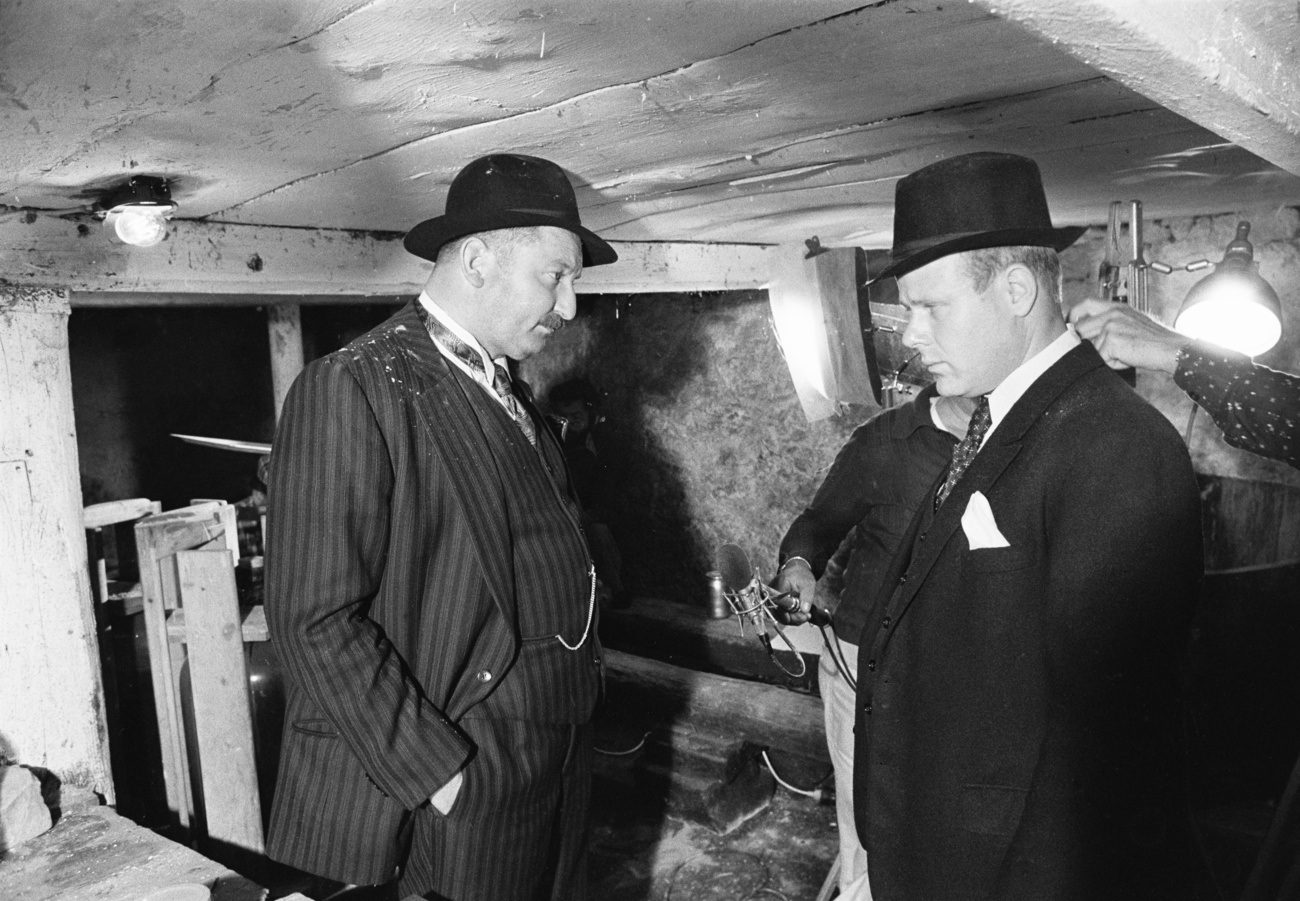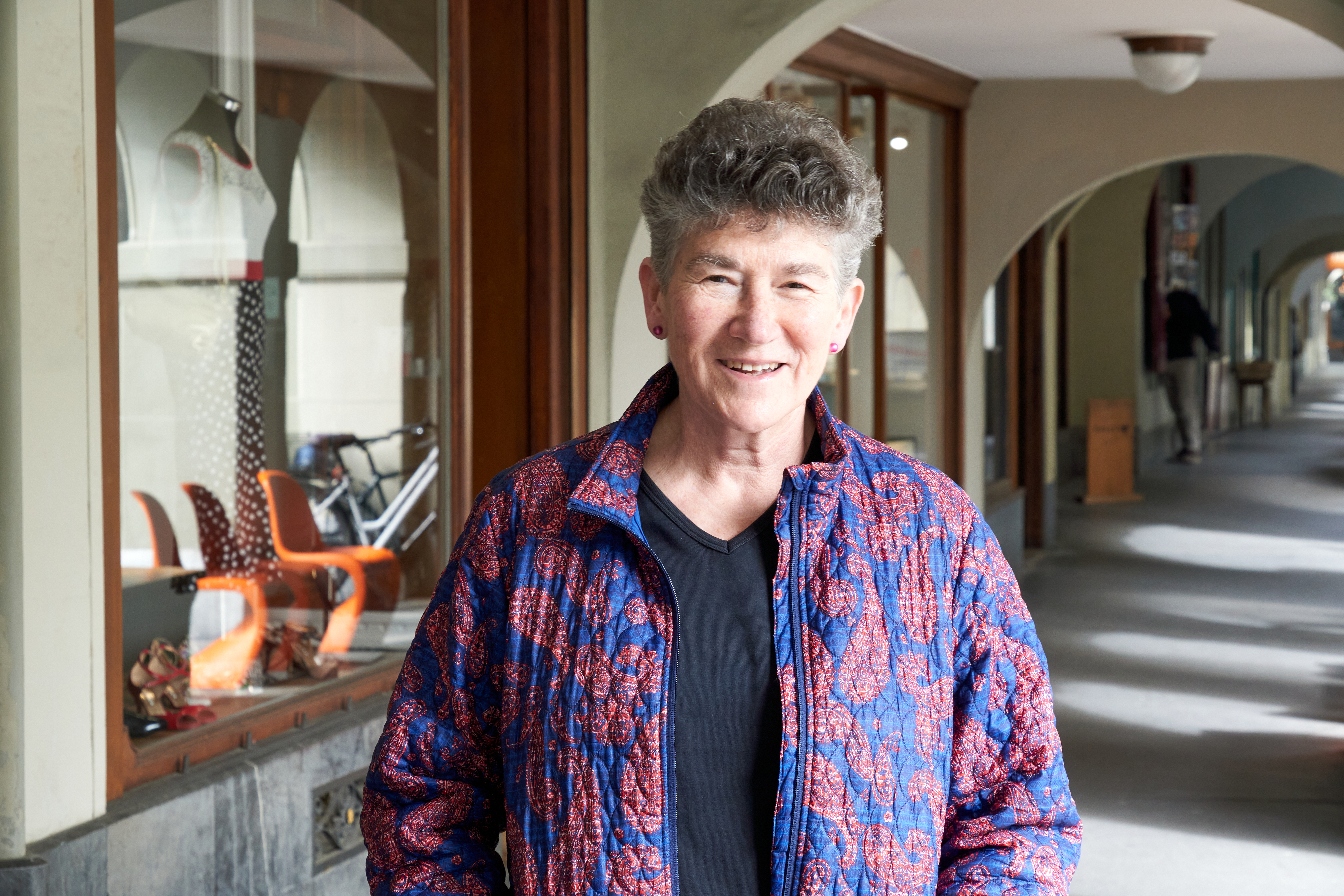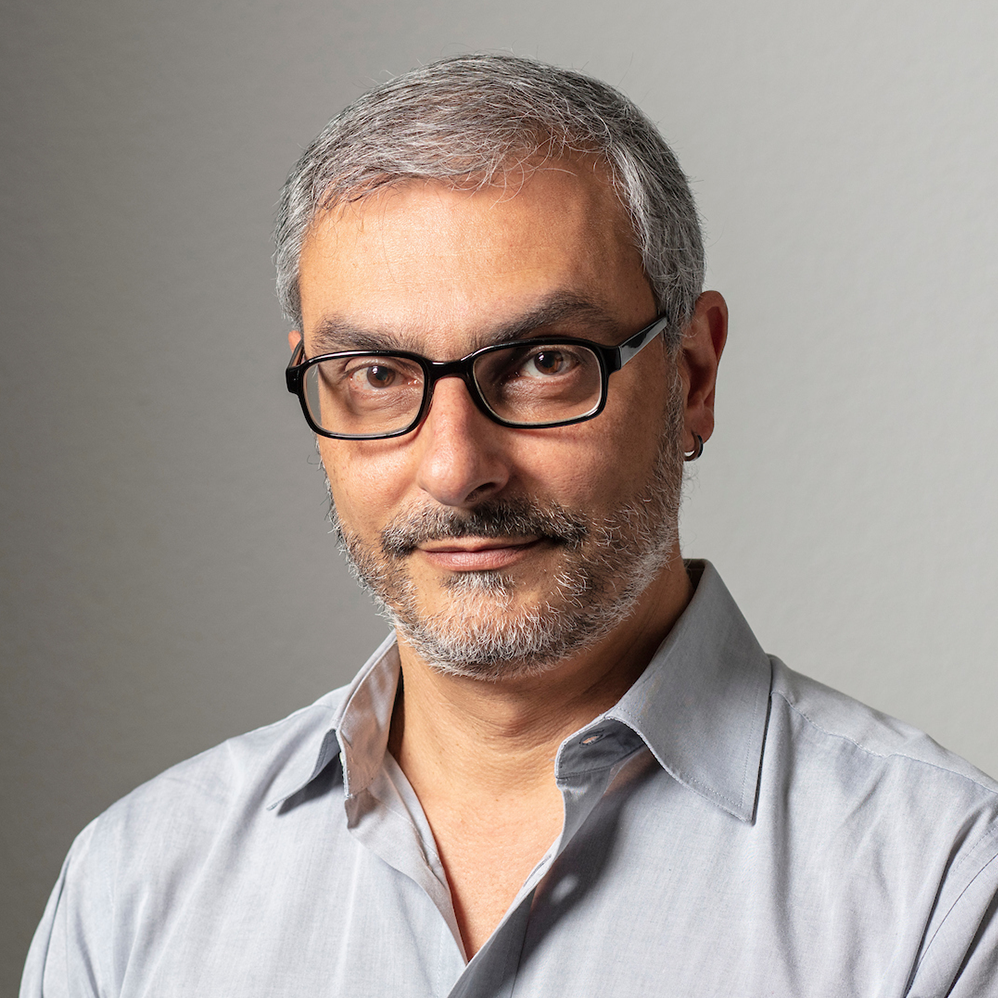American author turns Bern into a stage for murder mysteries

The fourth novel in the crime series Polizei Bern is hitting American bookstores now. Its author, Kim Hays, who has lived in Switzerland for 37 years, targets US audiences, but her mix of controversial issues and skeletons in the closet has thrilled Swiss readers too.
Switzerland is a very safe country. In 2024, there were 45 murdersExternal link in the country of roughly 9 million people. In the canton of BernExternal link, seven murders were recorded last year, and all were solved. So, is Switzerland in general – and its capital Bern in particular – an appropriate setting for crime thrillers?
“Sure!” says the American author Kim Hays in Zurich. The fourth novel in her crime series based in the Swiss city is now hitting bookshops in the United States. The books will also be available in a few Swiss shops, but Hays says she wrote her Polizei Bern series for an American audience.
“I hoped that some Swiss people would read it, but the books are in English,” she says. “Of course I would like them to be translated into German.” She explains that under the terms of her contract, the translation rights remain with her US publisher, Seventh Street Books in New Jersey, until three years after publication, and translations are very expensive.
Even so, the novels have found their way home. Hays says she was surprised to receive emails from Swiss readers. “Not many”, she says, but more than expected. As for reviews, “unfortunately, I haven’t had any in the New York Times”, but she has found resonance in a few specialised crime literature outlets as well as in Kirkus Reviews, a magazine for the publishing world.
As an expatriate who has lived for 37 years in Switzerland, Hays was lucky to find a US publisher without the help of a literary agent. She began looking for an agent when she first started writing her novels in 2012 but was rejected time and again. When she eventually struck a deal with Seventh Street Books, she already had the first three titles ready. The first one, Pesticide, was published in 2022.
Agents and publishers who had previously rejected her book doubted readers would be drawn by the Swiss setting, she says. “One agent wrote me back and said, ‘Well, if your book was set in Paris, we might be interested.’ To which I thought, ‘There are already so many mysteries set in Paris. Doesn’t she realize this?’”

More
Expat authors: the successors of Joyce and Shelley
‘CSI Bern’
The Polizei Bern series revolves around investigations led by homicide detective Giuliana Linder and her partner Renzo Donatelli. Hays inverts the stereotype of investigating duos where older, male detectives are accompanied by pretty female sidekicks. Giuliana is the senior detective, and Renzo is the junior; she is a decade older, and Renzo is the one gifted with awe-inspiring good looks. Professionally, they complete each other, a complicity that inevitably leads to a constant, and never resolved, sexual tension.
“I wanted to play with male-female tropes,” Hays explains. “I wanted them to be culturally different, with a significant age difference, and distinct sexual appeal. So I thought, I’m going to have a younger guy fall in love with an older woman because I am an older woman, and I just thought it was funny. Of course, it’s nothing new. People are doing that more now, in real life, but the idea was probably in my mind early on to have that sort of constellation.”
Donatelli, as his name suggests, has Italian roots – he is the son of immigrants to Switzerland, a “secondo”, as the Swiss call the second-generation offspring of migrants. The choice was not random, Hays says, since she needed a character from another culture who would reflect her own impressions of Switzerland as a foreigner, an American who grew up in Puerto Rico.
“I wanted Renzo to be able to roll his eyes when the Swiss-Germans do something very Swiss-German. Something that an Italian would find odd, like two brothers who shake hands instead of embracing,” she says.

An eye for procedures
Hays has received much praise for her portrayal of Bernese police investigative procedures. She says she did a lot of homework, helped by a retired policewoman and former prosecutor who also happens to be her neighbour.
The author managed to insert Swiss peculiarities into the crime scene genre’s formulas – even via the private lives of her characters, in which family routines reflect a rather homogeneous society. Almost all of her police officers, suspects, and killers have a middle-class background. Relatable marital conflicts arise from the difficult balance of sharing family duties and household chores.
But what really distinguishes the Polizei Bern series is how Hays develops her plots around dark chapters of Swiss history that still resonate today. The first novel, Pesticide, takes on the negative aspects of organic farming. Switzerland, like Austria and Germany, is very proud of its high standards of organic agriculture.
Sons and Brothers, the second installment, dives deep into the so-called Verdingkinder scandal – a decades-long official policy through which orphans or children from minority communities such as the Roma, Sinti, Yenish, and Travellers or from “failed” or “shameful” households (that is, single mothers, prostitutes, or simply the very poor) were forcibly taken by the state. These minors were sent to work on farms as cheap labour, and often kept in conditions akin to slavery. The practice ended only in the 1970s.
The third novel, A Fondness for Truth, has a dark modern-day setting: the murder victim is a lesbian married to a second-generation Swiss woman of Tamil origin. The couple faced racist and homophobic anonymous letters and were ostracised by a rigid caste system at odds with Western liberal values.
Hays navigates these issues taking care not to slip into controversy, using them more as props to keep the story and plot apace without daring deeper discussions. She admits that this is precisely her point, since her main goal is to entertain the reader while opening windows onto Swiss curiosities and historical perspectives.

Skeletons in the closet
Surprisingly, Hays avoids dealing with the most obvious skeletons in the Swiss closet. She has not tackled Nazi-looted art or gold in Swiss bank vaults, for example.
“I’ve tried to avoid bank-spanking because that is something that always gets written about,” she says. “I’m not trying to be nice to banking, but it has become such a stereotype for bad practices, such as hiding people’s money from tax authorities, or serving the interests of corrupt dictators. I write about crime on a human scale, so I look at the usual things that will make people upset enough to commit a crime, such as money, sexual jealousy, or revenge.”
So the investigations Linder and Donatelli conduct rarely escalate into uncovering full-scale political or financial conspiracies. Hays’ detectives tend to follow circumstantial contexts and make connections based on material evidence and a lot of psychological profiling. Serial killers are also out of the question.
“Frankly, I think they are very boring,” she says. “When you center your story around a peculiarly crazy person, then there’s not much to research. There is no broader context – social, psychological – to develop, because you’re just dealing with the specific pathology of a person who doesn’t have motives in the same sense as anybody else.”
Hays points out that the range of mental health conditions is so wide that anything can explain anything. It is the same with organised crime, another favourite subject in the crime fiction market.
“Organised crime functions at such a high level, almost like banks, which are organised and often criminal, but I won’t call them organised crime,” says Hays, laughing. “To me, it’s much more interesting to look at real people and why they would commit a crime.” After all, nobody is normal when seen from up close.

Edited by Catherine Hickley/gw

In compliance with the JTI standards
More: SWI swissinfo.ch certified by the Journalism Trust Initiative










You can find an overview of ongoing debates with our journalists here . Please join us!
If you want to start a conversation about a topic raised in this article or want to report factual errors, email us at english@swissinfo.ch.